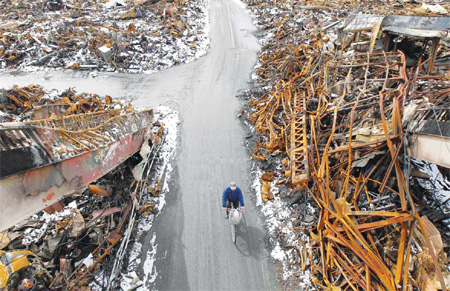Casualties and Damages
Woes mount for tsunami survivors
By Chang-Ran Kim (China Daily)
Updated: 2011-03-18 07:53
 |
Large Medium Small |
|
 A man rides a bicycle through an area hit by the earthquake and tsunami in Kesennuma, northern Japan, on Thursday. Kim Kyung-Hoon / Reuters |
OTSUCHI, Japan - Nearly a week after their home town was annihilated in a catastrophic tsunami, the 1,000-plus survivors of the small Japanese fishing town of Otsuchi are hanging by a thread.
|
||||
"You can't wash your hands or face," said 72-year-old Katsu Sawayama, seated in the middle of the high school gymnasium, the biggest of the shelters in a town where more than half the 17,000 residents are still missing.
Adding to their woes, a heavy snowstorm sent temperatures plunging below zero and blanketed acres of tsunami debris in white.
While international attention has been focused on Japan's efforts to stop damage at a quake-hit nuclear power plant from spiraling out of control, a massive salvage and rescue operation has slowly been gathering steam. Scores of villages, hamlets and towns lining Japan's northeast coast were flattened by tsunami waves that rolled in minutes after Friday's magnitude 9 earthquake.
About 850,000 households in the north were still without electricity, Tohuku Electric Power Co said, while the government said at least 1.5 million households lacked running water.
"There are some cases of dehydration," said Eric Ouannes, general director for Medecins Sans Frontieres in Japan, after he visited shelters in northern Miyagi and Iwate prefectures.
"We are seeing very small health problems but these can deteriorate. We have been restarting treatment for elderly people who have hypertension, diabetes and cardiovascular problems," he added.
Like tens of thousands of people along Japan's northeast coast, the Otsuchi survivors have nowhere else to go.
Meals are barely enough to sustain them - half a rice ball and a small bowl of miso soup is a luxury; a slice of bread might have to feed a family of three.
"Whatever they give us, we just gratefully receive. At least they're feeding us three times a day," said Sayawama.
International experts say that panic over fears of radiation leaks from the Fukushima Daiichi nuclear plant could detract from problems likely to affect survivors of the quake and tsunami, such as the cold, access to clean water and getting enough food.
"People are getting so concerned about what are at the moment pretty low levels of radiation," said Richard Wakeford of the University of Manchester in the United Kingdom. "But the real problems ... are in dealing with the earthquake and the tsunami.
"If this was a developing country, we'd have people going down in their hundreds and thousands with the likes of typhoid and cholera by now. The questions should be: Where is the sewage going? What is the state of the drinking water? If I were a public health official, that would be my principle concern."
| 分享按钮 |



